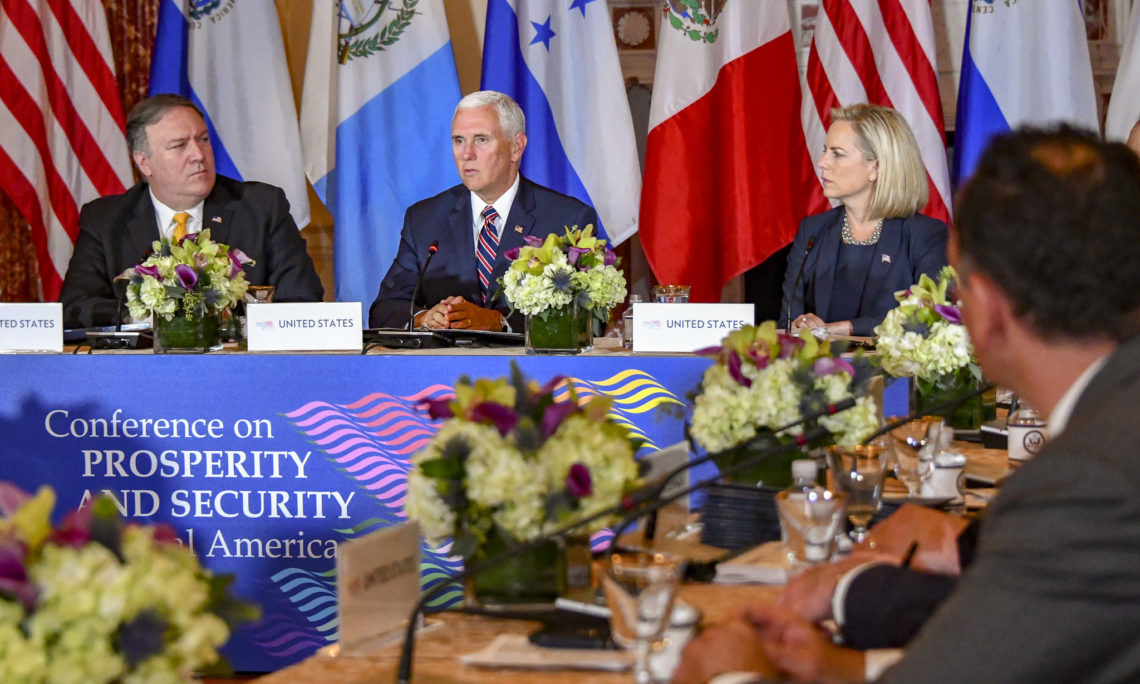 Image courtesy of the US Embassy in Guatemala
Image courtesy of the US Embassy in Guatemala
A New Path Forward: Crafting Sustainable and Structural U.S. Security Policy in the Northern Triangle
Poverty, violence, and poor governance in El Salvador, Honduras, and Guatemala—the three countries that form the Northern Triangle of Central America (NTC)—have long constituted a security challenge in the Western Hemisphere. The United States’ previous attempts to support socio-economic development and political stability in the region, however, have been reactive and one-dimensional, with little measurable impact. As President Joe Biden works to renew the United States’ commitment to Central America, his administration must pursue a sustained, structural approach to addressing security crises in the NTC.
Background
The NTC has experienced a complex mix of adverse security and socio-economic conditions. Corruption, poor governance, a lack of economic opportunity (exacerbated by climate change), and organized crime have precipitated the region’s rapid internal decline:
- According to the World Bank, 60% of Guatemalans, 50% of Hondurans, and 20% of Salvadorians live below their country’s poverty line.
- A strong gang presence has made the region home to some of the world’s highest homicide rates.
- A judicial system hampered by weak law enforcement and corruption has sent impunity levels soaring to upwards of 95%.
These domestic conditions have had a far-reaching impact. According to estimates from the U.S. government, about 265,000 residents of the NTC left their homes each year between 2014 and 2019. The irregular migration has manifested itself in recent surges in the number of unaccompanied children from the NTC apprehended at the U.S.-Mexico border. Additionally, significant quantities of cocaine bound for the U.S. first pass through the Central American corridor. Drug trafficking sustains U.S.-based criminal networks and often operates alongside human trafficking, weapons smuggling, and extortion.
U.S. Responses
The dominant U.S. policy approach in the NTC has espoused “tough-on-crime and pro-development” interventions focused on counter-narcotics and migration. For example, the George W. Bush administration’s Mérida Initiative and the Obama administration’s Central American Regional Security Initiative (CARSI) and U.S. Strategy for Engagement in Central America funded programs in the NTC that trained police forces, provided poverty relief, and fought corruption and drug trafficking, among other things. President Trump suspended aid to the NTC in March 2019, citing the region’s inability to control emigration to the U.S., and worked to bolster security at the southwestern border.
While these programs yielded some successes (such as fruitful USAID anti-poverty efforts and community-based violence-prevention programs), they suffered from several shortcomings:
- The U.S. focus on drugs and immigration was misaligned with NTC development priorities and lacked domestic buy-in.
- “Tough-on-Crime” (mano dura) policies indirectly supported the NTC’s criminal enterprise by crowding prisons and failed to promote institutional reforms.
- Aid dollars were reactive responses to migration, not sustained commitments.
A Renewed U.S. Approach to Security in the NTC: Policy Recommendations
As the Biden administration engages with the NTC, they must promote policies that address these faults:
Revise the “Tough-On-Crime” Approach. Instead of focusing on irregular migration and narcotics, the U.S. should tackle structural factors that enable crime and violence in the NTC in the first place.
- While supporting the professionalization of NTC police forces, the U.S. should also address impunity and corruption. The U.S. should reinvigorate local anti-corruption efforts (like the once-successful CICIG in Honduras) and gain government buy-in (key to fighting corruption) through regional partnerships and conditional aid.
- The U.S. should promote evidence-based community-led violence-prevention programs, like school-based interventions, community-police partnerships, and reintegration programs for gang-involved youth, instead of the mano dura approach.
Support Sustained Economic Development. Relief funding must remain central to U.S. policy in the NTC, as it lifts households from poverty and supports violence prevention. The U.S. could also back alternate long-term, multilateral strategies to boost economic opportunity in the NTC, such as:
- Public-Private Partnerships (PPPs): PPPs are cooperative, long-term relationships between government entities and businesses. They generally outlast governments, have access to more capital, and present less risk to public entities. In the past, they have supported infrastructure replacement in post-war Liberia, enhanced access to education in Pakistan, and increased agricultural production in West Africa.
- Remittances: In 2020, NTC ex-pats sent some $9.8B USD in remittances to their relatives back home. Remittances have been shown to help households emerge from poverty, navigate uncertainty, build their creditworthiness, and access healthcare and education. By lowering stateside transaction costs and promoting financial literacy (among both remittance senders and recipients), the U.S. could increase the productivity of these remittance payments. The U.S. could also support regional remittance-distribution infrastructures, promoting digital banking and peer-to-peer cryptocurrency trading as efficient and low-cost alternatives to traditional money-transfer services.





